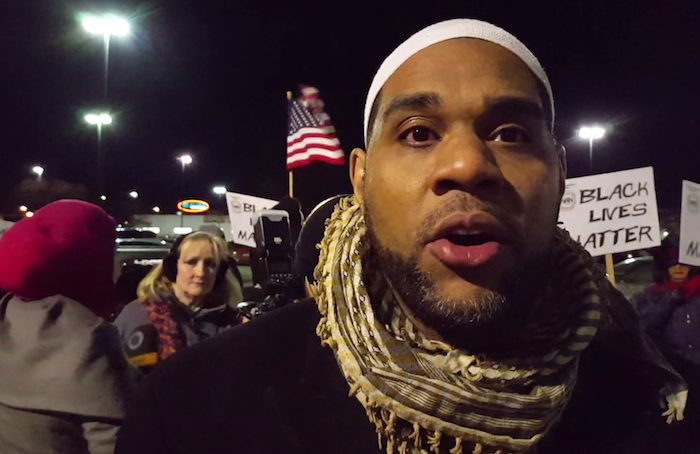
|
| Dawud Walid among demonstrators at a rally demanding accountability from Dearborn Police after Kevin Mathews death, Jan. 4. |
The recent settlement of an excessive force lawsuit by the Dearborn Police against a mentally impaired man, Ali Beydoun, of Lebanese origin is part of an ongoing saga regarding this embattled police department.
The Department of Justice (DOJ) has now stepped in the picture after a breakdown of citizen trust due to fatal shootings of two African Americans, one of the victims, Kevin Matthews, being shot at least 5 times while unarmed including one shot being at close range.
The National Action Network (NAN), the Michigan chapter of the Council on American-Islamic Relations (CAIR-MI) and other civil rights groups raised concerns in the media and in protests regarding the responses of the department pertaining to the homicide of Matthews in particular.
Also, the police force simply does not represent the demographics of the population. Almost half of Dearborn’s population consists of people of color, yet its citizens are policed by primarily by officers who do not reflect this demographical reality and its cultural sensitivities.
This is extremely problematic given that the department has a difficult time of retaining Arab American police officers, in large part to allegations of racism and hostility within the force.
Civil rights activists, moreover, are very concerned about the extent of the department’s involvement in the FBI’s “Shared Responsibilities Committees,” which in effect is cementing informant work in the community. Given the revelation of the Khalil Abu Rayyan case involving a 21-year-old Dearborn Heights man with substance abuse issues in which the FBI used two female informants to lure him into a potential terrorism case, the concerns about how local law enforcement may collude with such efforts are real.
This holds even more true for the Dearborn Police given its involvement in a 2009 FBI raid which led to the fatal shooting of Imam Luqman Abdullah in which 3 confidential informants were involved in that situation. CAIR-MI sued the Dearborn Police a year later for suppressing public information about the Abdullah case per its non-compliance with the Freedom of Information Act (FOIA).
The bottom line is that there is an institutional problem in the Dearborn Police Department. It is not simply about its chief or the lack nice police officers on the force. There is apparently a law enforcement cultural problem, which transcends personalities.
Deconstructing institutional troubles is not an easy task. Adding a few more faces of color does not solve the problem alone, nor having nicer faces who periodically meet with a select group of community leaders.
Policy changes and reforming mindsets take a long time, especially as it pertains to a department with a long track record of having a non-diverse police force located in America’s historically most hyper-segregated metropolitan area.
The DOJ can play at least a partially positive role in this endeavor as it regards assisting the department with more robust strategies in addressing implicit bias, which leads to excessive force such as what took place to Beydoun and Matthews. Academics and community partners at the Wayne State Law School’s Detroit Action Equity Lab (DEAL), which I was a fellow in 2014, should also be brought in to assist.
However, the DOJ has worked hand in hand with the FBI pertaining to some troublesome positions and cases such as the Abu Rayyan and Abdullah cases. The Justice Department cannot provide the entire solution when they too are part of the problem. Correction needs to take place through grassroots organizing to adjust city government policies pertaining to the police department’s involvement with the Joint Terrorism Task Force (JTTF) and programs that use controversial recruitment and usage of informants.
Being pro-law enforcement accountability is not anti-law enforcement. Not having had a personally negative experience with the Dearborn Police also does not equal zero problems within the department as if all is well.
Acknowledging these truths does not dismiss the good that the department does in tracking down robberies to protecting our mosques when threats come their way. Nor does it belittle the officers on the force who try to serve with integrity on a daily basis while placing their lives on the line.
Holding the Dearborn Police Department to a higher level of accountability and seeking its improvement are good for the force and ultimately in the best long term interests of the citizens of Dearborn and those who come to Dearborn to study at its colleges, pray at its houses of worship and patronize its businesses and restaurants.
-Dawud Walid is the Michigan executive director of the Council on American Islamic Relations.






Leave a Reply